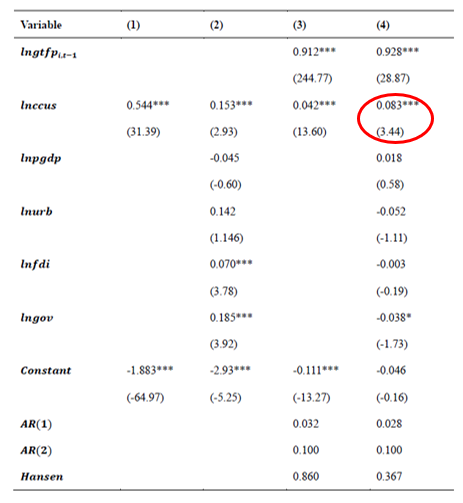Boosting Green Productivity: The Role of CCUS Technology*
9/15 2024
Author: Farhad Taghizadeh-Hesary
* This shrort article is based on the study published as: Dong K., Wang J., Zhao C., Taghizadeh-Hesary F. and Phoumin H. (2024). Toward a Green Energy System: How Does Carbon Capture, Utilization, and Storage Technology Innovation Promote Green Total Factor Productivity?. Asian Economic Papers 23 (2): 59–88. https://doi.org/10.1162/asep_a_00892
The issue of climate change has attracted a great deal of attention from governments and scholars worldwide, with the mitigation of CO2 emissions becoming the primary goal. Carbon capture, utilization, and storage (CCUS) technology is a vital cleantech tool It captures, transports, stores, and utilizes CO2 emissions to achieve a “carbon budget” and ensure that climate change goals are met. Despite its emission reduction potential, CCUS has not yet achieved commercial viability due to its high costs. This also leads to an unclear impact on green total factor productivity (GTFP), which requires further examination.
Dong et al. (2024) addressed the following research questions, and this piece summarizes their findings:
I. Are Chinese CCUS technology innovations conducive to improving GTFP?
II. Will other factors moderate the nexus between CCUS technology innovation and GTFP?
III. If the positive impact of CCUS technology innovation on GTFP exists, what are the impact mechanisms?
2.Empirical Results
Table 1 provides the results of the effect model (columns (1) and (2)) and the SYS-GMM technique (columns (3) and (4)). CCUS technological innovation significantly promotes GTFP. Specifically, column (4) results show that for every 1% increase in the CCUS technological innovation index, GTFP will increase by 0.0828%. In addition, the moderating effect regression found that Industrial structure and carbon emission efficiency are good mediators of the impact of CCUS technological innovation on GTFP. Specifically, CCUS technological innovation significantly contributes to GTFP by promoting upgrading industrial structures and improving carbon emission efficiency. The moderation effect regression shows that environmental regulation plays a moderating role in the CCUS technological innovation-GTFP nexus. Specifically, environmental regulation effectively promotes the positive impact of CCUS technological innovation on GTFP.
Table 1. Benchmark regression results on the nexus between GTFP and CCUS technology

3.Policy Recommendation
This section provides policy implications based on the above research findings (Dong et al. 2024). CCUS technology innovation can effectively promote GTFP, which has significant implications for the coordinated development of the economy and environmental protection. It is recommended that governments increase funding support for CCUS technology research and development, provide more research funds and project grants for enterprises, and promote CCUS technology innovation and result transformation.
Moreover, the governments need to improve the environmental policy and regulatory framework, enhance policy guidance and support for CCUS technology innovation and application, strengthen supervision and law enforcement on polluting enterprises, and promote better implementation of CCUS technology by enterprises.
In addition, the governments can enhance policy communication and coordination, promote the application and promotion of CCUS technology in energy, steel, chemical, and other industries, build intensive and large-scale application models, and create a good cooperation and win-win situation.
Moreover, CCUS technology innovation effectively promotes GTFP by upgrading the industrial structure and increasing carbon emission efficiency. This suggests governments should accelerate policy guidance and support for high-carbon-emitting industries to encourage enterprises to adopt CCUS technology for carbon capture and storage.
On the other hand, environmental regulation can enhance the green effect of CCUS technology innovation. Therefore, the governments can formulate relevant laws and regulations, clarify the application scope of CCUS technology, strengthen management, and ensure the green and healthy development of CCUS technology.
Finally, the governments should provide more flexible and preferential tax policies and financial subsidies for energy enterprises, encourage enterprises to innovate independently, improve the market competitiveness and application level of CCUS technology, and accelerate the support and promotion of CCUS for green economic growth and energy transition.
